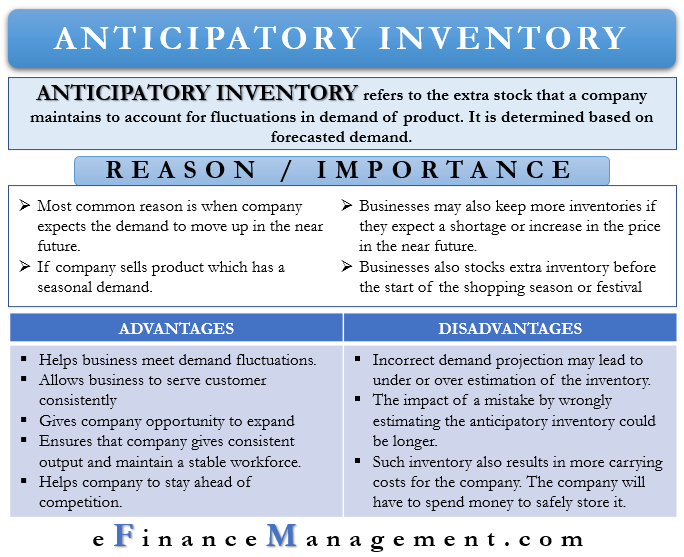Anticipatory inventory is the extra stock that a company maintains to account for fluctuations in demand for the product. A company keeps this type of stock-based on future demand expectations. A company can hold such a stock seasonally. For example, companies keep more stock of umbrellas or raincoats for the rainy season than any other season.
This type of inventory could appear quite similar to the safety stock. But, it differs from the safety stock because a company maintains it to address fluctuations in demand. This fluctuation is the expectation that there will be more demand in the coming time.
Importance of Anticipatory Inventory
The following are the reasons why a company may feel the need to keep anticipatory inventory:
- The most common cause is when a company expects the demand to move up soon, such as a strike. For instance, at the time of the coronavirus pandemic, many retailers kept a considerable stock of face masks and sanitizers to meet the sudden rise in demand.
- If the product that a company sells has a seasonal demand, then also the company will maintain this inventory seasonally. For example, a company selling ice cream will keep more stock during summers than in winter.
- Businesses may also keep more inventories if they expect a shortage or an increase in the price shortly. For example, suppose the government is considering a new tax on electronics. It may encourage retailers to buy more of it now as they would get more expensive after implementing the new or additional tax.
- Businesses also stock extra inventory before starting the shopping season or festival, such as Halloween and Christmas.
Advantages of Anticipatory Inventory
The following are the advantages of the anticipatory inventory:
- This inventory helps a business to meet fluctuations in consumer demands.
- It allows the business to serve the consumers consistently. Thereby boosting profits and ensuring that the company does not lose its clients.
- It allows the company to expand the business when there is a fluctuation in demand.
- Such inventory also ensures that the company can give consistent output and maintain a stable workforce throughout the year. This process is called ‘smoothing’ because it allows the business to avoid layoffs even when the demand for the product is low. A company uses the low demand period to prepare for the time when the demand will be more.
- It also helps a company to stay ahead of the competition.
- Often such inventory fetches more revenue per unit in times of sudden demand upsurge. Therefore, such anticipation and preparation give a higher profit margin.

Disadvantages of Anticipatory Inventory
The following are the disadvantages of the anticipatory inventory:
- A significant challenge for a company maintaining this inventory is to come up with correct demand forecasting. If a company cannot predict the demand accurately, it may result in under or overestimation of the inventory.
- The impact of a mistake by wrongly estimating the anticipatory inventory could be longer. The effect of an error in calculating the regular inventory remains only till the time the inventory lasts. But, with the anticipation inventory, a company may take longer to sell it as it is the extra inventory.
- Such inventory also results in more carrying costs for the company. The company will have to spend money to store it safely.
- Moreover, if such inventory is of seasonal requirement or fashion segment, then often, this anticipatory inventory needs to be sold at a discount or distress value.
Inventory Management System
As said above, the biggest challenge when maintaining excess inventory is that there is no guarantee that the company will sell it. Or the demand forecast may prove wrong. In such a case, the company may face heavy losses if it cannot sell the extra inventory.
A company can minimize such challenges or risks by using an efficient inventory management system. Such a system could help a company monitor stock levels and give an accurate sales record. It, in turn, will help to make forecasts more accurate.
Moreover, an inventory management system could also help a company to avoid stock outages. It will be possible because of accurate forecasting and correctly estimating an increase in demand.
In all, we can say that all the information from the inventory management system makes it easier to plan for anticipatory inventory.
Along with an efficient inventory management system, a company can minimize losses by protecting damage or loss to the extra stock. A company can do this by regularly rotating the additional stock towards normal production. This way, the excess inventory does not get obsolete.
Final Words
Even though the anticipatory inventory is helpful for a business, it comes with its costs. These costs are carrying costs, purchase costs, and other costs. So, a company needs to maintain a balance between the cost and volume of this inventory to ensure that it does not block too much money in it, nor does it keep the inventory too low to miss on potential revenue opportunities and clients.
Keep reading more on Other Types of Inventories.
Quiz on Anticipatory Inventory

